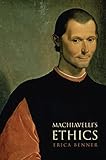Machiavelli's Ethics / Erica Benner.
Material type: TextPublisher: Princeton, NJ : Princeton University Press, [2009]Copyright date: ©2010Edition: Course BookDescription: 1 online resourceContent type:
TextPublisher: Princeton, NJ : Princeton University Press, [2009]Copyright date: ©2010Edition: Course BookDescription: 1 online resourceContent type: - 9780691141770
- 9781400831845
- 170.92 22
- B785.M24
- online - DeGruyter
- Issued also in print.
| Item type | Current library | Call number | URL | Status | Notes | Barcode | |
|---|---|---|---|---|---|---|---|
 eBook
eBook
|
Biblioteca "Angelicum" Pont. Univ. S.Tommaso d'Aquino Nuvola online | online - DeGruyter (Browse shelf(Opens below)) | Online access | Not for loan (Accesso limitato) | Accesso per gli utenti autorizzati / Access for authorized users | (dgr)9781400831845 |
Browsing Biblioteca "Angelicum" Pont. Univ. S.Tommaso d'Aquino shelves, Shelving location: Nuvola online Close shelf browser (Hides shelf browser)

|

|

|

|

|

|

|
||
| online - DeGruyter Ten Hills Farm : The Forgotten History of Slavery in the North / | online - DeGruyter Haydn and His World / | online - DeGruyter "If You Leave Us Here, We Will Die" : How Genocide Was Stopped in East Timor / | online - DeGruyter Machiavelli's Ethics / | online - DeGruyter Charter Schools : Hope or Hype? / | online - DeGruyter Quantitative Techniques for Competition and Antitrust Analysis / | online - DeGruyter A Very Brief History of Eternity / |
Frontmatter -- Contents -- Acknowledgments -- Abbreviations -- Introduction -- I Contexts -- Chapter 1. Civil Reasonings: Machiavelli's Practical Filosofia -- Chapter 2. Ancient Sources: Dissimulation in Greek Ethics -- II. Foundations -- Chapter 3. Imitation and Knowledge -- Chapter 4. Necessity and Virtue -- Chapter 5. Human Nature and Human Orders -- III. Principles -- Chapter 6. Free Agency and Desires for Freedom -- Chapter 7. Free Orders -- Chapter 8. Justice and Injustice -- Chapter 9. Ends and Means -- IV Politics -- Chapter 10. Ordinary and Extraordinary Authority -- Chapter 11. Legislators and Princes -- Chapter 12. Expansion and Empire -- Conclusions -- Bibliography -- Index
restricted access online access with authorization star
http://purl.org/coar/access_right/c_16ec
Machiavelli's Ethics challenges the most entrenched understandings of Machiavelli, arguing that he was a moral and political philosopher who consistently favored the rule of law over that of men, that he had a coherent theory of justice, and that he did not defend the "Machiavellian" maxim that the ends justify the means. By carefully reconstructing the principled foundations of his political theory, Erica Benner gives the most complete account yet of Machiavelli's thought. She argues that his difficult and puzzling style of writing owes far more to ancient Greek sources than is usually recognized, as does his chief aim: to teach readers not how to produce deceptive political appearances and rhetoric, but how to see through them. Drawing on a close reading of Greek authors--including Thucydides, Xenophon, Plato, and Plutarch--Benner identifies a powerful and neglected key to understanding Machiavelli. This important new interpretation is based on the most comprehensive study of Machiavelli's writings to date, including a detailed examination of all of his major works: The Prince, The Discourses, The Art of War, and Florentine Histories. It helps explain why readers such as Bacon and Rousseau could see Machiavelli as a fellow moral philosopher, and how they could view The Prince as an ethical and republican text. By identifying a rigorous structure of principles behind Machiavelli's historical examples, the book should also open up fresh debates about his relationship to later philosophers, including Rousseau, Hobbes, and Kant.
Issued also in print.
Mode of access: Internet via World Wide Web.
In English.
Description based on online resource; title from PDF title page (publisher's Web site, viewed 08. Jul 2019)


